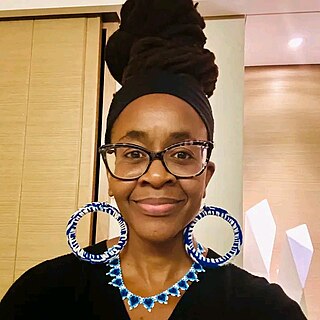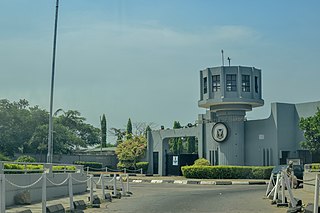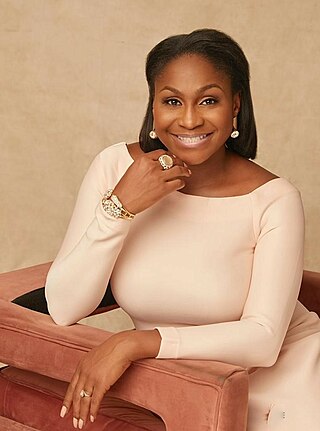
Edmund Cartwright was an English inventor. He graduated from Oxford University and went on to invent the power loom. Married to local Elizabeth McMac at 19, he was the brother of Major John Cartwright, a political reformer and radical, and George Cartwright, explorer of Labrador.

Chimamanda Ngozi Adichie is a Nigerian author who is regarded as a central figure in postcolonial feminist literature. She is the author of the award-winning novels Purple Hibiscus (2003), Half of a Yellow Sun (2006) and Americanah (2013). Her other works include the book essays We Should All Be Feminists (2014); Dear Ijeawele, or A Feminist Manifesto in Fifteen Suggestions (2017); a memoir tribute to her father, Notes on Grief (2021); and a children's book, Mama's Sleeping Scarf (2023).

Nigerian literature may be roughly defined as the literary writing by citizens of the nation of Nigeria for Nigerian readers, addressing Nigerian issues. This encompasses writers in a number of languages, including not only English but Igbo, Urhobo, Yoruba, and in the northern part of the county Hausa and Nupe. More broadly, it includes British Nigerians, Nigerian Americans and other members of the African diaspora.

Nnedimma Nkemdili "Nnedi" Okorafor is a Nigerian American writer of science fiction and fantasy for both children and adults. She is best known for her Binti Series and her novels Who Fears Death, Zahrah the Windseeker, Akata Witch, Akata Warrior, Lagoon and Remote Control. She has also written for comics and film.

The University of Ibadan (UI) is a public research university in Ibadan, Nigeria. The university was once a college of the University of London. The college was established in 1948 as University College Ibadan, one of many colleges within the University of London. It became an independent university in 1962 and is the oldest degree-awarding institution in Nigeria. Through its graduate network, the University of Ibadan has contributed to the political, industrial, economic and cultural development of Nigeria.

Rosemary Tonks was an English poet and author. After publishing two poetry collections, six novels, and pieces in numerous media outlets, she disappeared from the public eye following her conversion to Fundamentalist Christianity in the 1970s; little was known about her life past that point, until her death.

Genevieve Nnaji is a Nigerian actress, producer, and director. She won the Africa Movie Academy Award for Best Actress in a Leading Role in 2005, making her the first actor to win the award. In 2011, she was honoured as a Member of the Order of the Federal Republic by the Nigerian government for her contributions to Nollywood. Her directorial debut movie, Lionheart, is the first Netflix film from Nigeria and the first Nigerian submission for the Oscars. The movie was disqualified for having most of its dialogue in English. After having spent decades in the movie industry, she was profiled alongside some celebrities and business executives in 2020 in two new books by publisher and Editor in Chief of Yes International! magazine, Azuh Arinze.
Rosemary Esehagu is a Nigerian writer. She was born and raised in Lagos, Nigeria, to a family of six children. In 1997, she came to the United States to advance her education. She attended Williams College, a prestigious liberal arts school in Williamstown, Massachusetts, where she earned a BA in Psychology. Her first novel, The Looming Fog, was published in 2006. She lives in the District of Columbia and is finishing her second novel.

Black science fiction or black speculative fiction is an umbrella term that covers a variety of activities within the science fiction, fantasy, and horror genres where people of the African diaspora take part or are depicted. Some of its defining characteristics include a critique of the social structures leading to black oppression paired with an investment in social change. Black science fiction is "fed by technology but not led by it." This means that black science fiction often explores with human engagement with technology instead of technology as an innate good.

Women in Nigeria are a diverse group of individuals who have a wide range of experiences and backgrounds. They are mothers, daughters, sisters, wives, entrepreneurs, professionals, and activists. Women in Nigeria face numerous challenges, including gender inequality, poverty, and a lack of access to education and healthcare. Despite these challenges, Nigerian women are making strides in all areas of life and are becoming increasingly empowered to take control of their lives and their futures.
The Urhobos are people located in southern Nigeria, near the northwestern Niger Delta.
Domestic violence is prominent in Nigeria as in other parts of Africa. There is a deep cultural belief in Nigeria that it is socially acceptable to hit a woman as a disciplinary measure. Cases of Domestic violence are on the high and show no signs of reduction in Nigeria, regardless of age, tribe, religion, or even social status. The CLEEN Foundation reports 1 in every 3 respondents identified themselves as a victim of domestic violence. The survey also found a nationwide increase in domestic violence in the past 3 years from 21% in 2011 to 30% in 2013. A CLEEN Foundation's 2012 National Crime and Safety Survey demonstrated that 31% of the national sample confessed to being victims of domestic violence.

Osinachi Kalu Okoro Egbu, known professionally as Sinach, is a Nigerian singer, songwriter and senior worship leader, serving in this capacity for over 30 years. She is the first singer-songwriter to top the Billboard Christian Songwriter chart for 12 weeks in a row. Her song "Way Maker" received three nominations and won the Song of the Year at the 51st GMA Dove Awards, making her the first Nigerian to win the Award. She also won the BMI song of the year, and in 2021 was recognized by the US Congress while on tour in the United States of America.
Rosemary Uwemedimo is a Nigerian writer of children's fiction of English origin.

Rosemary Chukwuma is a Nigerian sprinter. She won a bronze medal in the 4 × 100 metres relay at the 2018 Commonwealth Games as well as a gold medal in the 4 × 100 metres relay at the 2019 African Games. In 2018, she won a gold medal in the 100 metres at the Summer Youth Olympics, clocking 11.17 seconds.
Chikodili Emelumadu is a British Nigerian speculative fiction writer.
Africanfuturism is a cultural aesthetic and philosophy of science that centers on the fusion of African culture, history, mythology, point of view, with technology based in Africa and not limiting to the diaspora. It was coined by Nigerian American writer Nnedi Okorafor in 2019 in a blog post as a single word. Nnedi Okorafor defines Africanfuturism as a sub-category of science fiction that is "directly rooted in African culture, history, mythology and point-of-view..and...does not privilege or center the West," is centered with optimistic "visions in the future," and is written by "people of African descent" while rooted in the African continent. As such its center is African, often does extend upon the continent of Africa, and includes the Black diaspora, including fantasy that is set in the future, making a narrative "more science fiction than fantasy" and typically has mystical elements. It is different from Afrofuturism, which focuses mainly on the African diaspora, particularly the United States. Works of Africanfuturism include science fiction, fantasy, alternate history, horror and magic realism.
Rosemary Inyama was a Nigerian Igbo educator, politician, businesswoman and community developer.

Omoayena Rosemary Odunbaku is a Nigerian development expert, university lecturer, human settlement officer with UN Habitat, and founder of the organization Her Ability Hub.












